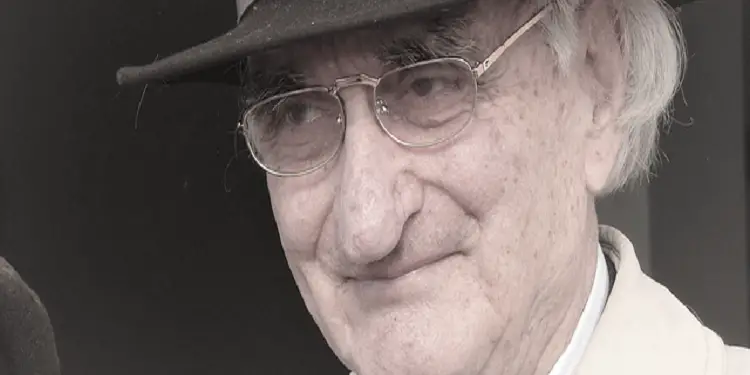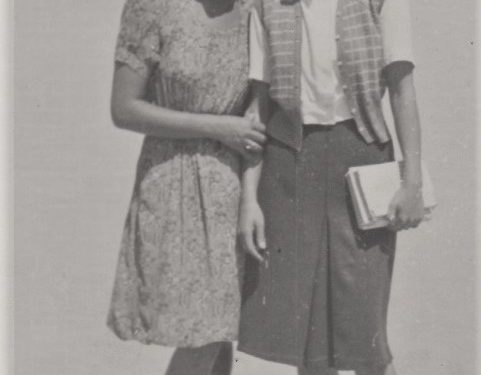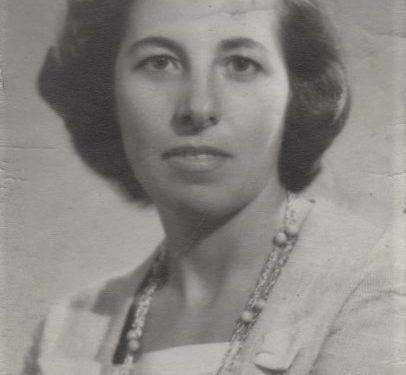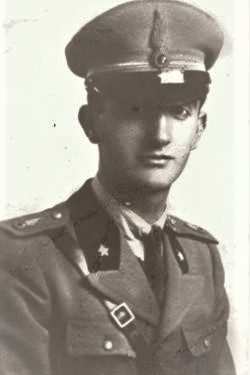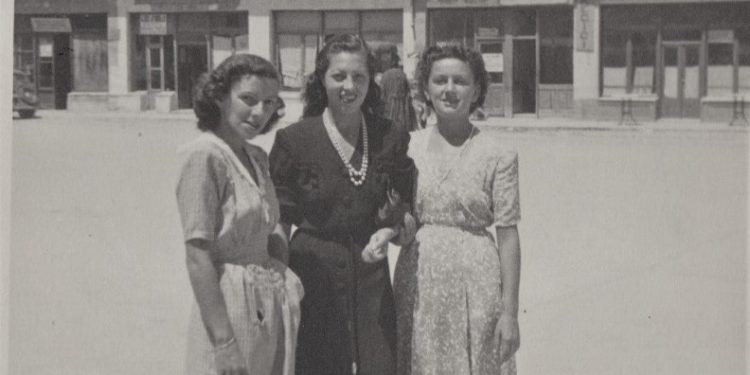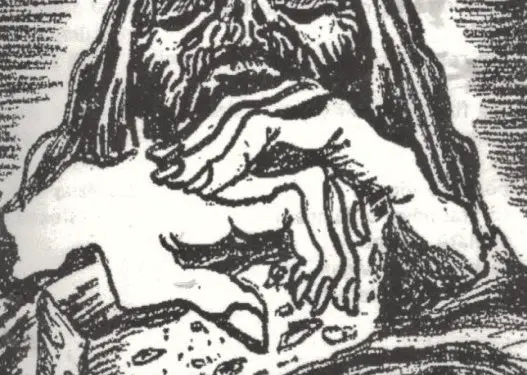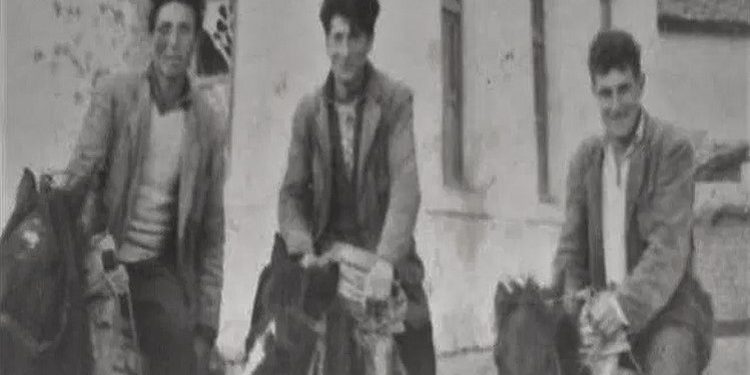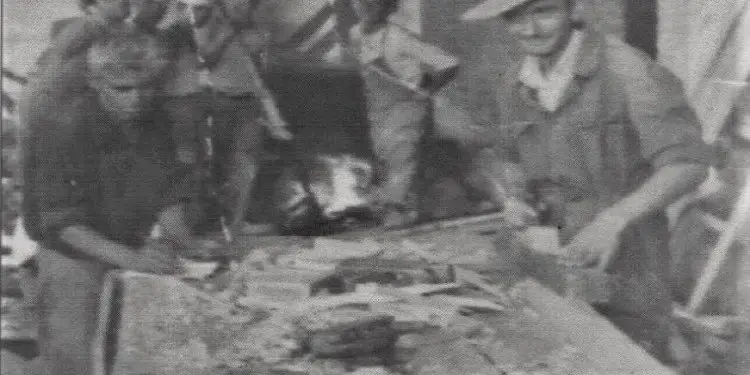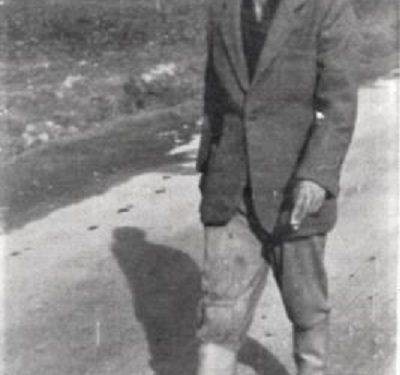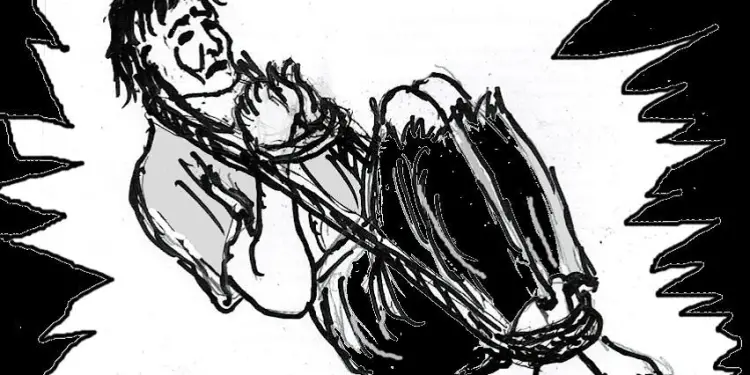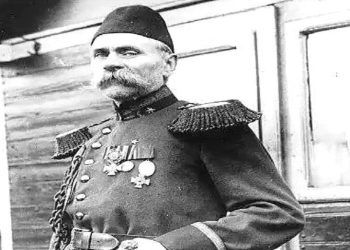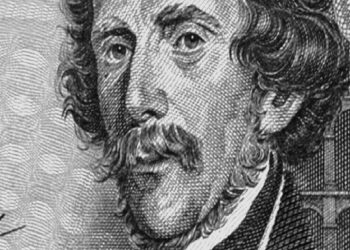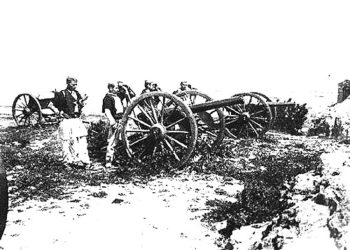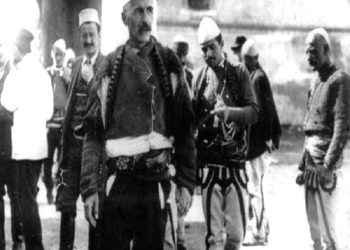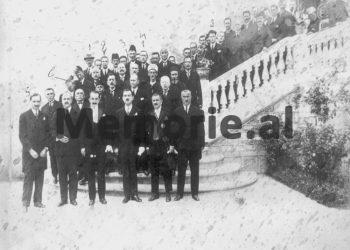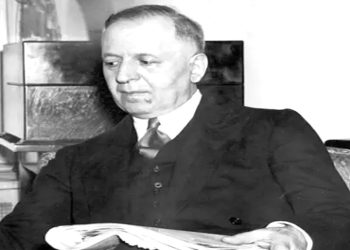From Lek Pervizi
Second part
Memorie.al / That morning, as soon as the light had started to come out, in the four cyclopean barracks where my crew and I were interned, the deafening metallic bangs of the bags, the brass shells of the guns, which were hit with iron rods, sounded all at once. The deafening thunder spread through the gorge of Vjosa, terrifying the surrounding mountains and the fortress of Ali Pasha Tepelena, which cast its black shadow over the internment camp created nearby by the communist regime of Tirana. The convicts woke up dazed from that sleep, which at least gave them some peace from their daily torments. The roar of the can was accompanied by the hysterical calls of the person in charge of each barracks: – Wake up! Appeal! Get up fast! On appeal, on appeal!
Continues from last issue
The deceased’s sister-in-law, Mrika, had lit a piece of wax candle as a sign of faith. The women muttered some prayers, and performed the religious services in the absence of a priest, as there was none in the camp. In that calmness, except when the ropama of the bag cracked:
– The doctor…! The doctor…! The sick should report to the building in front of the offices. Don’t miss any! …Quickly go and take my turn.
It was the manager of the barracks, Pretashi, who posted this notice. He passed there from my place and told me to be careful because I was the target of the police, who were just waiting for a reason to hurt me. How should I behave? Why should I care? In short, they told me, I was only in the hands of fate…of God…and of the doctor!
I went and took the long line, many with women, who made room for me and looked at me with sorrow and pity, instead of crying about their plight. The row was at the foot of a wall that protected us from the cold wind, where the warm rays of the sun fell, like a door. The deserted internees, lined up there, sat in silence, each immersed in his own sad thoughts. How will the situation be?
Soon, the doctor appeared with a policeman and the camp nurse, Andrea Shundi from Korça, and the internees called Patro. They first went to the two barracks where the two deaths had occurred. Doctor Konomi, who served in Tepelena, was also assigned to the camp, where he was visited from time to time by the sick. But he had not been there for three months (they had not brought him), although other deaths had occurred in the meantime.
Come and find out! He was a tall and thin man, a little gray. He wore a pair of large black-rimmed glasses. It didn’t take long and he came back and entered the building against the command with all the nurses. The policeman sat on a chair by the door and signaled to the first one in line, so the medical visit begins. It didn’t take long and it was my turn.
The policeman told me to go through and I found myself in front of the open door where the visitation took place. I stopped there, because the doctor and the nurse were talking to each other. My heart was pounding. My fate depended on this control. I was a bit nervous. I was waiting, my head stuck between the raised collar of the old coat. His eyes widened as he looked at the two characters they would decide for me. Hands spread open with those wounds, which were bleeding. Shaved and combed. When the doctor turns his head to me, looking at me from above his glasses, his mouth remains open in surprise:
– Oh Lord Patro…! What is this crucified Christ that you have brought me? He shouted in horror, slamming his hands on the table ready to stand up. The nurse, for his part, got used to my appearance, shrugged his shoulders because he didn’t see anything special about me.
– Stop bringing me such living corpses! The doctor continued to shout. I instinctively turned my head back, seeing that no one else had come after me. Nobody! I’m worried, why was I so bad in Katandisi? The policeman on duty had run, alerted by the doctor’s screams. The nurse reassured him that everything was going well. The policeman returned to his chair. Patro, who had recovered, spoke some Greek to the doctor, who immediately changed his demeanor.
– Come closer my son, come closer…! What have they done to you boy?…Where do these wounds come from…these stigmata…?! Tell me, Patro, did Krishi suffer more? I was close and he took my hands looking at them carefully and shaking his head.
– I have never seen such wounds…! What are they?! …Infection…? Vitamin deficiency… weakness…? Don’t worry my son. We will take care of you and you will definitely recover…! So you were the little son of Prenk Perviz? I knew your father when he was on duty in Korça and I was a doctor there. I know my mother too; even she is interned here, right?
The nurse had taken me to close the door. I told the doctor about our condition. They had taken my mother to work on an agricultural farm in Lushnje. My older brother, Valentini, was with me.
And the second brother, Genci, in prison. The doctor also wanted to know about the father. In Greece, I told him, four years now. When he was informed about our condition, he told Patros to write the medical report for physical work disability.
Three months of absolute rest. Radioscopy and analysis in Gjirokastra. Then he dictated the recipe, vitamins, fish oil and reconstituted syrup, which was left over from the Italian army in the camp pharmacy, in some boats. The nurse was not writing, thinking that all that the doctor dictated was useless, impossible work. But the doctor glanced at him and nodded. Patro completed the notes, glancing at me, as if to say: idle work, where do you drink water…! While the doctor was looking at me with a sorry expression.
– You can go good boy. Don’t worry at all. I will do my best. You take those medicines and stay calm and rest. With the report I issued you, and with those hands, you will not be reinstated. Then let’s see the results of radioscopy and analysis. I will speak to the camp commander myself. He hugged me and got excited. Patro looked surprised by the doctor’s behavior. Later, he told me how the doctor at the command had presented me in the most dramatic terms. He had described me as a living corpse!
When I got out of there, everyone looked at me like I was descended from Hana or Mars. They had heard the doctor’s scream. Crucified Christ…! A living corpse! So much so that even the policeman gives me a suspicious look. The women were ready to cry and their eyes shone with tears. Desolate boy! The doctor’s words were spread throughout the camp. My aunt, my mother Mrika, in that day dress of hers, was waiting for me at the door of the barracks, wrapped in a black wool scarf from the cold. There were also some women of my cousins sitting there, worried about me.
– Come my son, come! Do you do the medical examination? What did the doctor tell you? Come, I’ve saved a coffee for you. The wives of cousins Mrika e Ndue Gjergjit, Dila e Ndue Pal, Mrika e Llesh Gjergjit, Dila e Ndue Bajraktari, etc., were also worried, but I calmed them down and told you in two words, that the doctor had issued a work disability report.
They left to their barracks and I entered my barracks and followed my aunt and went to the place where they were staying, where Marta was waiting for the patient, and she also worried. I sat there for a while and explained to them how the work went and how the doctor gave me a vacation report and check-up in Gjirokastër and some medicines. I spent time with them and the coffee seemed to strengthen my body and mind.
Coffee in those conditions was something extraordinary, the apotheosis of luxury. But my aunt enjoyed the greatest respect from the Mirdites, as the wife of Kapidan Gjon, Prince of Mirdita. There were internees, men, who were helped by their children, who reminded them even with a little coffee, because it still existed and was sold in the private market, we still did not stop them.
So they remembered Mrika’s mother. I told them how the work went and how the doctor had received me well and how I later found out that he knew my father and mother and had been friendly and affectionate with me. I was totally shocked by what happened. I understood why women had so much respect and pity for me. According to them, I was already in that world. I had only a few days left to live. Dead forever!
As soon as I left my aunt, I ran straight to my place where I kept a piece of mirror, to see what kind of situation I was in. The doctor was right: my face had taken on the appearance of an ascetic, of Byzantine icons. Long, black, uncombed hair. We shaved his stubble black beard with two fingers, like a monk’s. The face is pale and withered. The thin neck could barely support the head.
Long and dry, like a caravaggio of walnuts, to scare away the birds. Except the skin remained on the bones. Hands with those bloody wounds, true stigmata. Christ himself would not have objected to the comparison that the doctor made, of my body with his, to be crucified. Then: living corpse! I couldn’t stand this! I was sinking deeper into my despair. I was on the brink of depression. How will I fare? Yes, as if I was the only one in that situation. How many others, in these circles of hell, had pale and withered faces? How many others who were interned and sick looked like me, living corpses!
Suddenly there was an unbearable shriek of the changa. The internees ran out, except for the children, the elderly, the sick and me. A large pot was raised, of trays, pots, and other vessels of every kind, made of aluminum, tin, bronze, copper, etc., which collided with each other. Everyone was running for their turn in front of the (so-called) cooking pots, which was a kind of thin soup, taralang. The boilers consisted of six half-barrels of oil.
The bread ration was also distributed. Rrok Kanti, grandson of Llesh Marashi, was assigned to be in charge of the kitchen, unable to do physical work because he had several serious wounds received in the fight with the Pursuit Forces, when Major Lleshi was captured, who was then hanged in Shkodra. He had escaped death. He had tried to kill himself, so as not to hand I over alive, but the bullets had passed through his heart without touching him. They kept him for five years in the Burrel prison, from where he was brought to Tepelena.
A two-meter-tall mountaineer with an athletic body was seen, but he was hiding from the wounds on his body. Six women with small children worked in the kitchen. They prepared the so-called dish, from expired food left in warehouses: rice; Oatmeal, beans and pasta that the worm had entered. That day there was semolina soup (crushed wheat), bruised by the metal of the kettles. It was divided by one spoon per person.
The internees were forced to eat it because there was no other choice to feed them. An existential philosophy was on the order of the day. Worms, flies and other insects were also those products of nature and served to enrich and improve that soup with a special taste, which could not be found even in Chinese restaurants. The struggle for existence, what did not force a person to do in such circumstances, where people were treated like animals?
It was one of my cousins’ wives, Mrika e Ndue Gjergjit, who brought me the bread ration and the bowl of food. I, like everyone else, swallowed that disgusting food, closing my eyes, so they wouldn’t recognize it for okra. One spoonful after another, fast and fast. I divided the bread into three parts. The largest piece I had for lunch seemed smaller than either of the other two pieces. I had the order of my brother, Valentin, to divide the ration into three parts, however small they were. The stomach thus had the opportunity to work, and the body to absorb the food, down to the last milligram.
Throughout the day, even the changa rested, and people had the opportunity to meet and exchange a few words between them. My cousin, little John, as he was called, to distinguish him from his great grandfather, Captain John, came to visit me. I told him about the medical visit and he used to laugh at the doctor’s words to me: “Christ crucified a living corpse”.
John didn’t notice any difference in me because he saw me every day. I told him about my school in Rome, and he enjoyed it.
Little John had been interned with his family at the age of seven, and now that he had turned twelve, he knew nothing of the outside world. Despite the age difference, they were friends and we stayed together all the time. Not that we were cousins. I promised him that I would teach him Italian as soon as my health issue was over.
We then went to visit the funeral of the late Gjok Kadeli, where we were greeted with respect by the guardians who guarded Gjoka. We were uncle and nephew from the two most important Catholic families of the north, where even in those miserable conditions, there was no lack of respect towards us. I had known the late Gjok Kadeli since the fortress – prison of Porto Palermo.
Gjoka was arrested and imprisoned two years ago, in the case of the murder of Bardhok Biba, the first secretary of Mirdita, on August 16, 1949. Because of that, the communists, through Mehmet Shehu, who carried out that operation, shot 14 people. Completely innocent and arrested 700 others, beating them in prisons, where, apart from a few who were shot, a good part died under torture.
Their families interned, nearly 2,500 people at once, in the Tepelena camp, full of forty trucks, which I had the chance to see myself when they passed through Tirana (before I was arrested), to add fear and terror to the people. Tepelena was already like a small Siberia, or Nazi Auschwitz. After they had tortured him and kept him in prison for a long time, they had brought Gjoka himself to Porto Palermo on the 20th, with a few men from Pukjana. Gjoka also had a brother who escaped, Pjetër Kadeli, a former teacher and soldier.
Gjoka was a serious, brave and loyal man, respected for his wisdom and manliness. But these qualities could not save him from mistreatment. Without food, without clothes, without tobacco and without any help, with his body tortured and exhausted from hard work, from hunger and cold, he could not endure the animalistic treatment of communist criminals. He fell seriously ill and ended his life there in that cruel camp.
The executioners were also Albanians who killed, tortured, imprisoned and exiled their Albanian brothers and sisters, sacrificing them in the holocaust to their Bolshevik ideology, and treating them more savagely than a foreign invader. This ugly truth is extremely difficult to conceive in the free world. After I parted from John, I went and sat down on my couch, and took a book from what my friend, Balto Bali, had sent me. Do you wish that among them there was an anthology of literature that I had at school in Rome, “Florilegio della Letteratura Italiana”!
I was longing for the happy time I had spent at my College. Do you think any of my friends and professors would think about me? Could they imagine where and how that Albanian student, whose name was Leka, was in Katandani? Dante’s verses sounded in my mind: “Nessun maggiore dolore, che ricordarsi del tempo felice nella miseria”! Eh, poor Dante, if you had removed what we Albanians were removing, who knows what other poem he would have written, not in fantasy but real, of a real earthly hell and not so beautiful invented and written 600 years ago.
The evening came and with it the workers returned from the exhausting work, men and women exhausted from the fatigue and hardships of that frosty day. The barracks space was filled with noise and noise. Those who were very tired went and lay down as if dead on their layers or, directly on the boards, who had neither bedding nor covering. But since movement between the barracks was allowed, people needed to talk to each other.
This time the attention was on the deceased. Many of the workers came to console Gjoka’s relatives and said goodbye to their suffering friend. The next day he was buried, and the workers did not allow them to accompany him to the last residence. For the command, work was the main thing and they didn’t want to know about the dead and burials. Didn’t they all die?
My friends of the same age gathered around me to find out how the medical visit went, because they had come and found out what the doctor had said. These were some young people from Shkodra, interned with their families, among them: Gjosho Vasija, Karlet Luka, Suzana Topalli, Bush Derguti, little Gjoni with her sisters, Kristina e Çelestina, Reshit Mulleti, Sabri Daci, Abdurrahman Kaloshi, Avni Agolli , Tomorr Dine, and others. I was already the man of the day.
We make jokes to lighten my mood. Gjosho Vasija, especially, who was prone to humor and jokes from Shkodra. I told them what I had told others. How the doctor’s words had spread to the four barracks. The cry of the doctor was heard throughout the camp: Christ is crucified! A living corpse! Gjosho was not without a joke: Hey Lek, Lek, God has put his hand on you to get those wounds, so that you don’t have to go to work. Because he had given it to us as well!
The appeal of the evening was made by three captains with Marshal Syrjajn at the head, in the role of Security, who passed from pier to pier, to see that no one was missing. They already knew the internees one by one. Capter Selfo with Pretash, stopped in front of the place of the deceased, where he left the orders for the burial the next day. Pretashi would appoint the people who would deal with that work.
To convey it, only a few old men and women from the relatives of the late Gjok Kadeli. None of the ranks of workers. It was eight o’clock, it was forbidden to move and there was noise in the barracks. When the electric lamps went out, everyone fell asleep. As I mentioned above, I was assigned a four-hour night watch along with another to control the peace. Everyone was sleeping and there was complete silence.
For the guards, they allowed me to turn on a small stove that warmed my hands. My friends had supplied me with wood to keep the stove burning, because the night was very cold. That night they sat there with me until the lights went out. One of them told me that it was God who protected me because such wounds could not exist, they were so strange. Had to laugh sometimes.
Fire was strictly prohibited inside the barracks. Only outside in a barracks destroyed by the Italo-Greek war, a fire was allowed, where something to eat could be prepared. Women could come any time to take care of the children. The men lit a fire to warm themselves, where they gathered around it with chattering rocks between them.
So that night, when everyone went to bed, I took care of the stove. Although it was forbidden to keep embers inside the barracks, but since the policemen did not enter there at night, I supplied embers to the three women guarding the funeral, who were carrying a brazier. The cold was sharp. Everyone slept soundly, disconnected from the day’s troubles. Silence and darkness reigned. Only a kerosene lamp was lit, where the dead were kept.
There were people who had neither a coat nor a cover and slept on the boards to collect kruspul. Others wrapped themselves in their old clothes that hadn’t been used in years. The government had not given up at all, not even for bedding, blankets, or clothing, quite unlike the Nazi camps, where those spoils were safe. Because when they had arrested them and put them in the trucks like sacks of potatoes, they had left only their body clothes, without allowing them to take other loot with them.
In the middle of the night, Ded Pjetri came and changed me, who, like me, was not allowed to work, since he was crippled in one hand. As I went to bed, I said good night to the women who guarded the Chest. In those moments I had the feeling that the women pitied me more, as a living corpse, than the desolate chest of the dead.
That doctor had given me a bad name. I ran and went up to my place where I took shelter under the ragged and dirty covers. I had to sleep on my back with my hands on my chest. Otherwise I couldn’t stay. That day had been full of events, so much so that it was too long for me.
The announcement of the death of Gjok Kadel, a desolate man…. ! Medical visit…. ! The doctor was horrified… ! Crucified Christ…. ! A living corpse…! The church remains all alone…! Mom far away on that farm in Lushnja…! The second brother, Genci, in prison, but where…? ….that we didn’t even hear from him…?! Valentine there in the special ward, chopping oaks…in that sheep shed…!
What about that…? He for beauty… in some hotel in Athens (as they told us)… What about us… us…? How will we fare…?! My eyelids were closed and I fell into a deep sleep. Another day had passed of those that would come unstoppable and countless, until who knows when!
This event inspires me again and again a poem “Ballad of bread”, which sums up that environment and that ghastly atmosphere where the living and the dead shared the ration of bread together, food was blessed, until the last moment we were tight in chest as a holy relic…!
I had written the poem on a piece of tobacco paper, which after memorizing it, I tore it up. If they found such writing, he would be imprisoned and even shot, as happened to others. Later I also made a drawing. Memorie.al




